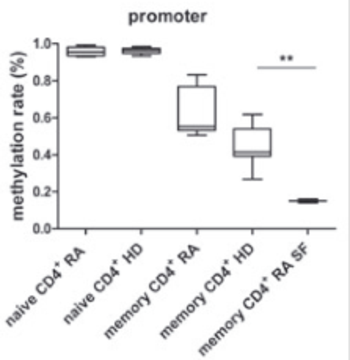Functional IFN-gamma memory in CD4+ T cells: Method for improved T cell therapy and disease monitoring in autoimmune diseases
Challenge
Th1 cells play a central role in the immune system and mediate protective as well as pathologic functions. Activated Th1 cells are characterized by IFN-gamma production which via a feedback-loop promotes differentiation of naïve CD4+ cells into Th1 cells. Th1 cells act on the cellular immune system by maximizing the killing efficacy of macrophages and the proliferation of cytotoxic CD8+ T cells. In this context, they play an important role in fighting tumor cells or in autoimmune diseases regarding a pathogenic setting. From the first activation of naïve T cells throughout their differentiation into mature subtypes such as CD4+ memory cells, the memory for functional IFN-gamma production after antigen exposure is passed on epigenetically. Understanding these epigenetic changes is therefore an interesting approach to generate potent CD4+ T cells for cell therapy or to diagnose and monitor autoimmune diseases.
Technology
Functional memory for IFN-gamma production after antigen exposure is established via decreased methylation at the IFNG promotor and CNS-1 region. The technology provides a T cell-specific methylation pattern in ex vivo effector/memory Th1 cells and highlights its dynamic changes during memory Th1 differentiation. In one application, a method by imprinting the specific methylation pattern into naive T cells was developed to generate memory Th1 cells displaying a robust long-term IFN-gamma response after re-activation. Many cell products suffer from decreased activity in the final therapeutic application since cells have lost re-activation capacity after the proliferation process. This method may therefore serve for generation of more effective and homogeneous cell therapy products. Moreover, quantitative DNA methylation analysis of the IFNG promoter and CNS-1 may also serve as a method for qualifying effective memory T cells
In another application, the methylation status of Th1 cells from RA patients in blood and synovial fluid samples is analyzed. Recruitment of Th1 cells to inflamed joints result in a clear change of distribution of these cells between periphery and sites of inflammation. The methylation pattern between samples from RA patients and healthy donors shows significant changes and allows therefore novel methods to monitor patients with autoimmune diseases.
Commercial Opportunity
Available for licensing or collaboration
Patent Situation
European Patent EP2465944 (granted 2016, priority from 16.12.2010)
Further Reading
Eur. J. Immunol. 2013, 43, 793-804.





